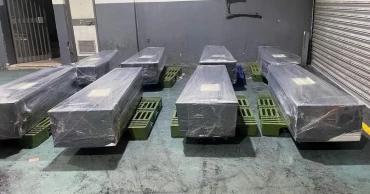Tunisia
Bodies of 8 Bangladeshis who died in Tunisia boat capsize to arrive today
The bodies of eight Bangladeshi nationals who died while attempting to cross the Mediterranean Sea to Europe and subsequently drowned near the coast of Tunisia will arrive in the country this afternoon.
According to a Facebook post by the Bangladesh Embassy in Libya, the coffins, transported via Saudia Airlines, are scheduled to arrive at Hazrat Shahjalal International Airport in Dhaka at 12:15 pm on May 2.
On Tuesday, in the presence of Bangladesh's Ambassador to Libya and non-resident envoy to Tunisia, Major General (Retd.) Abul Hasnat Mohammad Khairul Bashar, embassy officials transferred the bodies to the authorities at Tunis International Airport.
Hasan Mahmud to attend OIC Summit in Gambia
Following the tragic incident on the night of February 14, officials at the Bangladesh Embassy in Tripoli worked closely with Tunisia's Foreign Ministry and local authorities to manage the forensic identification, confirmation of identities through domestic agencies, issuance of death and medical certificates, and coordination of the repatriation process.
The Foreign Ministry's Africa Wing coordinated inter-ministerial efforts to facilitate the repatriation of the bodies, with assistance from the ministries of home, law, and funds from the Expatriates Welfare Ministry.
Among the deceased are Sajal, Noyon Biswas, Mamun Sheikh, Kazi Sajib, and Kaiser Khalifa from Madaripur district, and Rifat, Russel, and Imrul Kayes from Gopalganj district.
A boat, carrying 52 passengers and a sailor from the coast of Zuwarah on its way to Europe, sank off the Tunisian coast. Out of the 44 survivors, 27 are Bangladeshis, with others from Pakistan (8), Syria (5), and Egypt (4). Among the nine fatalities, eight were identified as Bangladeshis and one as a Pakistani national.
Read more: Bangladesh, Austria agree to conclude MoU on migration, mobility
1 year ago
Coastguards recover bodies of 41 migrants off Tunisian coast
Coastguards have recovered the dead of 41 migrants off the coast of Tunisia, as the number of people dying trying to reach Europe from Africa continues to rise.
According to a senior official, almost 200 people have drowned in the last ten days, reports BBC.
Tunisian morgues were running out of room, he said, and officials were struggling to keep up with the spike in attempted crossings.
"On Tuesday, we had more than 200 bodies, well beyond the capacity of the hospital, which creates a health problem," said Faouzi Masmoudi, justice official in the port city of Sfax where the central morgue for an area of around a million people is sited.
Also Read: At least 24 migrants die in waters off Tunisia over 2 days
"There is a problem with large numbers of corpses arriving on the shore. We don't know who they are or what shipwreck they came from and the number is increasing."
According the UN's migration agency, a total of roughly 300 individuals died during the previous week and a half, and 824 people have died this year, with those leaving from the Libyan coast are included.
Houssem Eddine Jebabli of the national guard told Reuters, the decomposed condition of the recovered bodies indicated that they had been submerged for several days.
According to him, the total number of fatalities in such a short period was unprecedented.
Tunisia has become a transit point for irregular migrants, primarily from Sub-Saharan Africa, attempting to reach Europe by sea.
The number of migrant deaths at sea has varied, with the UN's Missing Migrants Project reporting that 300 migrants died in the Central Mediterranean in the last 10 days alone.
2 years ago
At least 24 migrants die in waters off Tunisia over 2 days
At least 24 migrants trying to make their way to Europe died over two days when their fragile, overloaded boats sank, the prosecutor's office of the coastal port city of Sfax said Saturday.
The Tunisian Coast Guard pulled the bodies of four sub-Saharan migrants from the waters off the coast of Sfax on Saturday, while 36 migrants were saved and three others were missing, according to Faouzi Masmoudi, spokesman for the prosecutor's office in Sfax. A day earlier, 20 sub-Saharan migrants drowned when their boat went under about 35 miles (about 56 kilometers) from Sfax, and 17 others, including three children, were saved, Masmoudi said. He added that two of the survivors pulled from the water were reported in critical condition.
The numbers of migrants launching from Tunisian coastal waters and aiming to reach the shores of Italy have skyrocketed this year. The Coast Guard intercepted numerous other boats loaded with migrants on Friday and Saturday, Masmoudi said.
According to the Tunisian Forum for Economic and Social Rights, 132 migrants have died or disappeared in the first three months of this year while trying to reach Europe, reflecting the numbers of attempted and successful crossings.
Nearly two weeks ago, the Coast Guard recovered the bodies of 29 migrants in several boat sinkings.
The prosecutor's office in Sfax, one of the main regions for migrants to launch their perilous expeditions, is trying to find those who provide desperate migrants with small unseaworthy vessels to make voyages onward to Europe.
People fleeing conflict or poverty routinely take boats from Tunisian shores toward Europe, even though the central Mediterranean is the most dangerous migration route in the world, according to the International Organization for Migration. Many migrants are from sub-Saharan Africa.
2 years ago
Govt to import 1.5 lakh tonnes of fertilizer from Tunisia
The government will import 1.5 lakh tonnes of TSP fertilizer from Tunisia in 2023.
Bangladesh Agricultural Development Corporation (BADC) and Tunisian Chemical Group (GCT-Groupe Chimique Tunisien) signed an agreement in this regard on Tuesday at Tunis, capital of Tunisia.
BADC Chairman Abdullah Sazzad and GCT General manager Mohammed Ridha Shalgam signed the agreement on behalf of their respective sides.
Also Read: Govt okays fertilizer import, procurement of container scanner systems
BADC has been importing TSP fertilizer from Tunisia under government to government basis since 2008.
The TSP fertilizer from Tunisia has a demand in Bangladesh due to its good quality.
3 years ago
France vs Tunisia FIFA World Cup 2022 LIVE Streaming: Where and how to watch online and on TV Channel, predicted XI
Here you can get all the details as to When, Where, and How you can watch the FIFA World Cup 2022 between France vs Tunisia Live Streaming.
Tunisia will play to have their chance to qualify for the next round with a win against France, who have already qualified for Round of 16. While it will be a do-or-die match for the Eagles of Carthage, France would like to go to the knockout stage as the first team to have won all three matches in the group stage.
Already through to the knockout stage, reigning World Cup champion France play their final Group D match when Les Bleus square off against Tunisia in the 2022 World Cup on Wednesday at Education City Stadium in Doha. The French, ranked No. 4 in the world, sit atop the group with six points after victories over Australia and Denmark. Three points ahead of second place Australia, the French are overwhelming favorites to advance as the top team in the group.
Read more: Qatar World Cup: Spain has some work to do vs Japan to guarantee spot in the round of 16
Where and how to watch FIFA World Cup 2022 France vs Tunisia live in Bangladesh?
Bangladesh viewers can watch the match live on all of these channels: BTV, T Sports, PTE LTD and Viacom 18.
France vs Tunisia match on Toffee apps live-The digital platform powered by Banglalink
Bangladesh viewers can also enjoy live stream online the World Cup games on Toffee, the digital platform powered by Banglalink.
France vs Tunisia Match Live on Facebook and Youtube
Many Facebook pages and YouTube channels also live the match
How to watch France vs Tunisia live stream in India
In India, the World Cup is being televised on Sports18, but every game is being shown for free and in 4K via the JioCinema app. You can live stream France vs Tunisia on Thursday night.
Coverage is available in Hindi, English, Malayalam, Bengali and Tamil, and the JioCinema app is compatible with Chromecast, so you can get a big-screen experience.
Anyone outside of India who wants to watch their home World Cup coverage can just pick up a good VPN and follow the instructions above to safely live stream the action.
How to watch France vs Tunisia live stream in Australia
Football fans in Australia can watch France vs Tunisia, along with every World Cup 2022 game, on free-to-air SBS. You can tune in on TV or live stream France vs Tunisia using SBS On Demand.
SBS on Demand is free to use and works on a range of smart devices including mobile phones, smart TVs and web browsers.
How to watch France vs Tunisia live stream World Cup 2022 soccer in the US without cable
Soccer fans in the US can watch France vs Tunisia on FS1 and Peacock TV, with kick-off set for 11am ET / 8am PT on Sunday morning.
FS1 shares TV rights to the 2022 World Cup group stage with Fox, but Fox will be showing every game of the knockouts.
France vs Tunisia live stream without cable
If you don't have cable TV, a cord-cutting service is what you need for instant access to Fox and FS1. Sling Blue is the cheapest option. It's $40 per month but you can get your first month half-price with this discount.
FuboTV is another good option. It carries both Fox and FS1, and over 100 channels besides, and allows you to watch the World Cup 2022 in 4K HDR. It's more expensive at $69.99 a month, but first there's a FREE FuboTV trial.
Every game of the World Cup is also being shown on Peacock TV, but the catch is that commentary will be in Spanish. To make up for that, France vs Tunisia and a few other games are being shown for FREE. The Peacock price comes in at $4.99 a month and the service also offers live coverage of the NFL, EPL and WWE.
If you subscribe to Sling, Peacock or any other US streaming service, and find yourself unable to access coverage because you're out of the country, consider using a VPN – we rate ExpressVPN as the best of the best.
Read more: Argentina vs Poland FIFA World Cup 2022 LIVE Streaming: Where and how to watch online and on TV Channel, predicted XI
How to watch France vs Tunisia live stream in UK
Football fans in the UK can watch Argentina vs Poland live stream for free on BBC iPlayer, along with many more World Cup 2022 games, as coverage of the tournament is split evenly between the BBC and ITV.
Every BBC game will be on BBC TV channels in HD and also live streamed on BBC iPlayer in glorious 4K HDR. Just make sure you possess a valid TV license and that your device is 4K-compatible with iPlayer.
Away from home in the UK right now? No worries:
Use ExpressVPN to watch BBC iPlayer from abroad.
BBC iPlayer is free to use and works across a wide range of devices including smart TVs, laptops, games consoles, mobile phones, tablets and streaming sticks. You can watch all the other World Cup 2022 live streams for free on ITV Hub.
How to watch France vs Tunisia live stream in Canada
TSN is the place to watch every 2022 World Cup soccer game in Canada. If you get the channel as part of your cable deal, you'll be able to log in with the details of your provider for access France vs Tunisia live stream.
If you don't have cable, you can subscribe to TSN on a streaming-only basis for $19.99 a month or $199.90 per year.
If you decide to subscribe, or already have, remember you can take your favorite sports streaming service with you wherever you go – just try our No. 1 overall rated VPN 100% risk-free for 30-days and follow the instructions.
Read more: Christian Pulisic’s lone goal fires USA to last 16 with a win vs Iran
How to watch live France vs Tunisia Match live from Iran and others country?
If you're abroad during World Cup 2022, and want to tune into your usual home coverage, you'll most likely find yourself geo-blocked and will need to use a VPN to unlock your access.
A VPN is a piece of software that allows you to change your apparent location and World 2022 live streams from any country and streaming service you need. They're easy to use and super-secure. We rate ExpressVPN as the best VPN for streaming.
France vs Tunisia Match live on TV Channels
Bangladesh: BTV, Gazi TV, T-Sports
India: Sports18, Sports18 HD, Sony TV Networks
Pakistan: ARY Digital Network
Nepal: Media Hub Private Limited
Malaysia: Astro GO
Singapore: Singtel TV GO, CAST, StarHub TV+, MeWatch
New Zealand: Sky Go, Sky Sport NOW
Indian Subcontinent: Sony Network
What time and date will the FIFA World Cup 2022 France vs Tunisia match are played?
The Tunisia vs France match will be played on November 30 at 08:30 PM IST in the Education City Stadium, Ar Rayyan.
France vs Tunisia lineups: FIFA World Cup Qatar 2022
Tunisia predicted lineup:
Dahmen; Meriah, Bronn, Talbi; Skhiri, Kechrida, Laidouni, Abdi; Sliti, Msakni; Khazri
France predicted lineup:
Mandanda; Varane, Pavard, Konate, Camavinga; Fofana, Guendouzi; Coman, Mbappe, Griezmann; Thuram
France vs Tunisia Head-to-head record
Tunisia and France have not squared off against each other in the last 12 years. The last match these two played was an international friendly in May 2010 that resulted in a score of 1-1. Except that, Tunisia and France have played three times, with Tunisia winning one and France winning twice.
3 years ago
Why are World Cup players donning unusual face masks on pitch?
From South Korea's Son Heung-min, Croatia's Joško Gvardiol, Tunisia's Ellyes Skhiri, Belgium's Thomas Meunier to Iran's Alireza Beiranvand, several players have been spotted wearing unusual face masks on the pitch during the FIFA World Cup 2022 matches in Qatar, drawing comparisons to Batman and the Phantom of the Opera.
The masks, made from materials like polycarbonate, are leaving social media users curious as to why the footballers are sporting the black shields.
But it's not a fashion statement. When football players suffer facial injuries, they frequently don protective masks. Some of these masks are 3D printed, enabling them to be customised to each player's facial features.
Read more: France's Benzema ruled out of FIFA World Cup Qatar 2022
Players such as Pierre-Emerick Aubameyang, Fernando Torres, and Antonio Rudiger wore face masks before.
RB Leipzig centre-back Gvardiol sported a black protective mask during the Group F match against Morocco and Canada.
The reason for the 20-year-old sporting the face covering is he had a collision with teammate Willi Orban in a Bundesliga match on November 10, with scans later showing he had broken his nose and suffered minor injuries to his face and eyes.
Also read: Neymar to miss Brazil’s second World Cup match due to injury
In a similar on-field collision, Son suffered a fracture in his face, specifically around the eye socket, while playing for Tottenham during a November 1 Champions League win against Marseille.
The 30-year-old winger also stepped onto the field against Uruguay and Ghana, donning a black carbon fibre mask.
FC Köln midfielder Ellyes donned a mask against Denmark and Australia in Group D. The 27-year-old is nursing a broken cheekbone after suffering an injury in October.
Read More: Qatari bathrobes’: German commentator under fire for disparaging remark about traditional attire
Belgium's Borussia Dortmund star Thomas Meunier was also seen wearing a mask against the Red Devils' match against Canada.
In Dortmund's match against Hannover 96 earlier this season, the defender fractured his cheekbone and had to undergo surgery.
3 years ago
Tunisia on edge as president suspends parliament, fires PM
Troops surrounded Tunisia’s parliament and blocked its speaker from entering Monday after the president suspended the legislature and fired the prime minister and other top members of government, sparking concerns for the North African country’s young democracy.
In the face of nationwide protests over Tunisia’s economic troubles and the government’s handling of the coronavirus crisis, President Kais Saied decided late Sunday to dismiss the officials, including the justice and defense ministers.
Some demonstrators cheered the firings, shouting with joy and waving Tunisian flags.
But others accused the president of a power grab, and the country’s overseas allies expressed concern that it might be descending again into autocracy. In a move sure to fuel those worries, police raided the offices of broadcaster Al-Jazeera and ordered it shut down.
READ: Tunisian president fires premier after violent protests
Tunisia, which ignited the Arab Spring in 2011 when protests led to the overthrow of its longtime autocratic leader, is often regarded as the only success story of those uprisings.
But democracy didn’t bring prosperity. Tunisia’s economy was already flailing before the pandemic hit, with 18% unemployment, and young people demanding jobs and an end to police brutality protested in large numbers earlier this year.
The government recently announced cuts to food and fuel subsidies as it sought its fourth loan from the International Monetary Fund in a decade, further fueling anger in impoverished regions.
The pandemic has only compounded those problems, and the government recently reimposed lockdowns and other virus restrictions in the face of one of Africa’s worst outbreaks.
Angry at the economic malaise and the poor handling of the pandemic, thousands of protesters defied virus restrictions and scorching heat in the capital, Tunis, and other cities Sunday to demand the dissolution of parliament. The largely young crowds shouted “Get out!” and slogans calling for an early election and economic reforms. Clashes erupted in many places.
“I must shoulder the responsibility and I have done so. I have chosen to stand by the people,” the president said in a solemn televised address.
Saied said he had to fire the prime minister and suspend parliament because of concerns over public violence. He said he acted according to the law — but parliamentary speaker Rached Ghannouchi, who heads the Islamist party that dominates the legislature, said the president didn’t consult with him or the prime minister as required. The three have been in conflict.
READ: Bangladeshi migrants among 43 missing as boat sinks off Tunisia
“We have taken these decisions ... until social peace returns to Tunisia and until we save the state,” Saied said.
While the dissolution of parliament cheered some protesters, others in Tunisia were opposed — and the composition of each camp wasn’t entirely clear. Police intervened Monday to prevent clashes outside the parliament building between demonstrators supporting the president and lawmakers from the dominant Ennahdha party and their allies who opposed the move. Both sides shouted and some threw stones, according to an Associated Press reporter.
Ghannouchi, the speaker, tried to enter parliament overnight, but police and military forces guarding the site stopped him. He sat in a car outside the building for nearly 12 hours before leaving Monday afternoon — his next steps were unclear.
He called the president’s move “a coup against the constitution and the (Arab Spring) revolution,” and insisted the parliament would continue to work.
Saifeddine Makhlouf, founder of and lawmaker in a coalition of hardline Islamists, also denounced the president’s move as a coup.
“We will not let it pass,” he said.
Tensions between the prime minister and president have been blamed for poor management of the virus, while a bungled vaccination drive led to the dismissal of the health minister this month.
To date, 7% of the population has been fully vaccinated, while more than 90% of the country’s intensive care unit beds are occupied, according to health ministry figures. Videos have circulated on social media showing bodies left in the middle of wards as morgues struggle to deal with growing deaths.
Ennahdha has been a particular target, accused of focusing on its internal concerns instead of managing the virus.
Security forces also moved in Monday on the Tunis offices of Al-Jazeera, the Qatar-based satellite news network said on its Facebook page. The reason for the move was not immediately clear.
Al-Jazeera, citing its journalists, said 10 “heavily armed police officers” entered their bureau without a warrant and asked everyone to leave. “The reporters’ phones and other equipment were confiscated, and they were not allowed back into the building to retrieve their personal belongs,” the organization said.
Qatar and its Al-Jazeera network have been viewed by some Middle Eastern nations as promoting Islamist groups like the Muslim Brotherhood. Its offices have been shut down in other countries over that, most noticeably in Egypt after the 2013 coup that brought current President Abdel-Fattah el-Sissi to office.
Qatar’s Foreign Ministry said it hoped “the voice of wisdom” would prevail in the turmoil and that the rule of law would be established again.
Inside and outside Tunisia, from the U.N. to the European Union and beyond, concern was raised about whether the nascent democracy was taking an authoritarian turn.
Former President Moncef Marzouki called for political dialogue, saying in a Facebook video, “We made a huge leap backward tonight, we are back to dictatorship.”
U.N. officials were in touch with Tunisians “trying to see to it that all of the various parties ... do what they can to ensure that the situation does remain calm,” deputy spokesman Farhan Haq said. The already volatile region “cannot bear to have more unrest than it has presently had,” he said.
German Foreign Ministry spokesperson Maria Adebahr said the government was in discussion with Tunisian authorities about the “worrisome” situation.
READ: Tunisian carrying Quran fatally stabs 3 in French church
“We think it’s important now to return really quickly to the constitutional order,” Adebahr told reporters in Berlin. She stopped short of calling it a coup, but said the Tunisian president appeared to be relying on a “pretty broad interpretation of the constitution” to defend his actions.
France, Tunisia’s former colonial ruler, said it counts on “respect for a state of law and the return, as soon as possible, to the normal functioning of institutions.” Paris called on all to avoid violence “and preserve democratic advances.”
Italy, likewise, appealed for respect of the Tunisian Constitution and the rule of law, while Turkey hoped “democratic legitimacy” is soon restored.
The president invoked a constitutional article that allows him to assume executive power and freeze parliament for an unspecified period of time in cases of “imminent danger threatening the institutions of the nation and the independence of the country and hindering the regular functioning of the public powers.”
4 years ago
Tunisian president fires premier after violent protests
Tunisia’s president fired the country’s prime minister Sunday and froze parliament’s activities after violent demonstrations over the country’s pandemic and economic situation.
Protesters erupted with celebration in the streets of Tunis after the late-night announcement.
Read: 49 Bangladeshi migrants rescued from Mediterranean
President Kais Saied also lifted the immunity of all parliament members and said he would name a new prime minister in the coming hours to bring calm to the country. He used a special constitutional measure allowing him to assume executive power and freeze parliament for an unspecified period of time until normal institutional workings can be restored.
“We have taken these decisions ... until social peace returns to Tunisia and until we save the state,” he said in a televised address after an emergency security meeting following nationwide protests.
Thousands of people defied virus restrictions and scorching heat to demonstrate Sunday in the capital of Tunis and other cities. The largely young crowds shouted “Get out!” and slogans calling for the dissolution of parliament and early elections.
Read: Mini concert organized in Tunisia to express solidarity with China
The protests were called on the 64th anniversary of Tunisia’s independence by a new group called the July 25 Movement.
Security forces deployed in force, especially in Tunis where police blockades blocked all streets leading to the main artery of the capital, Avenue Bourguiba. The avenue was a key site for the Tunisian revolution a decade ago that brought down a dictatorial regime and unleashed the Arab Spring uprisings.
Police also deployed around the parliament, preventing demonstrators from accessing it.
Police used tear gas to disperse some demonstrators throwing projectiles at officers and made several arrests. Clashes also took place in several other towns, notably in Nabeul, Sousse, Kairouan, Sfax and Tozeur.
Protesters also stormed the offices of the Islamist movement Ennahdha, the dominant force in parliament. Videos circulating online showed smoke pouring out of the Ennahdha building. The attackers damaged computers and other equipment inside and threw documents onto the streets.
The party denounced the attack, saying that “criminal gangs” from inside and outside Tunisia are trying to “seed chaos and destruction in the service of an agenda aimed at harming the Tunisian democratic process.”
On the coronavirus front, Tunisia has reimposed lockdowns and other virus restrictions because it’s facing one of Africa’s worst virus outbreaks.
4 years ago
49 Bangladeshi migrants rescued from Mediterranean
Tunisia navy has rescued 49 undocumented Bangladeshi migrants from the Mediterranean Sea.
The Bangladesh nationals boarded the oil platform "Didon" Thursday after their boat broke down 80km off the coastal town of Zarzis, close to the Libyan border, according to Tunis Afrique Presse.
The migrants, aged between 16 and 50, were heading towards Europe and had set sail from the Libyan coast on July 5, the Tunisian defence ministry said.
Also read: Bangladeshi migrants among 43 missing as boat sinks off Tunisia
"The Bangladesh nationals were transferred to the El Ktef seaport in Ben Guerdane city where they will be handed over to National Guard," it added.
Several migrant boats sank recently while trying to reach Europe as more people are now trying to make the dangerous voyage across the Mediterranean Sea to the continent amid warmer summer weather.
Also read: 20 migrants dead off Tunisia after boat sinks, more missing
Between June 26 and July 3, Tunisian naval authorities fished out 49 bodies of migrants and saved 78 after four boats sank off the coast of Sfax city.
On July 3, at least 43 migrants, including Bangladeshis, went missing while 84 were rescued after a boat heading towards Europe drowned off the coast of Tunisia.
4 years ago
Bangladeshi migrants among 43 missing as boat sinks off Tunisia
At least 43 migrants, including Bangladeshis, are missing while 84 were rescued after a boat heading towards Europe sank off the coast of Tunisia on Saturday, the Tunisian Red Crescent said.
Mongi Slim, head of the organisation, told The Associated Press that the boat, which was carrying 127 migrants, left Libya's coastal city of Zuwara on Friday to cross the Mediterranean Sea towards Italy.
He said 46 Sudanese, 16 Eritreans and 12 Bangladeshis were among the migrants.
Also read: Speedboat sinks in Padma, 26 dead
The defence ministry's spokesperson, Mohamed Zekri, said the 84 migrants were rescued by fishermen. He declined to confirm the drowning of the other migrants.
Libya is a frequent departure point for migrants making the dangerous Mediterranean Sea crossing. Several shipwrecks from smugglers' boats carrying migrants have occurred in recent weeks, as attempts to reach Europe become more frequent amid warmer summer weather.
Last week, Tunisian coast guards found seven bodies on the beaches of Djerba, an island off the southern coast. They were buried at the cemetery for migrants in Zarzis, Tunisia, who perished in the Mediterranean Sea.
Also read: 20 migrants dead off Tunisia after boat sinks, more missing
The head of the Red Crescent, meanwhile, launched an urgent call about the fate of hundreds of migrants who escaped death as his organisation has no means to provide housing.
"The three centres in Zarzis are full and cannot shelter more people. We also have 380 other migrants in confinement in Djerba with nowhere to go," Slim said.
4 years ago






.jpg)

.jpg)







